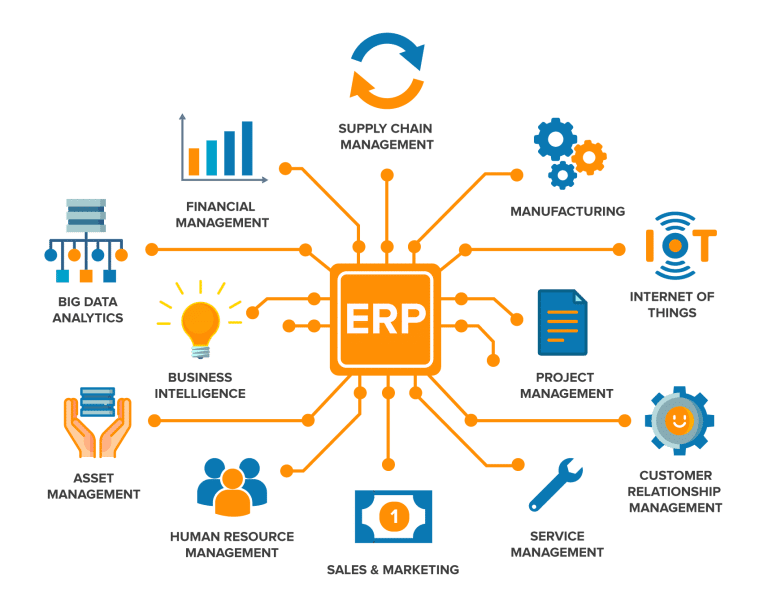In today’s fast-paced digital economy, small businesses are facing unprecedented challenges—and opportunities. With rising customer expectations, intense competition, and a rapidly evolving tech landscape, it’s becoming increasingly clear that traditional tools like spreadsheets, manual processes, or disconnected software are no longer sufficient to run a modern small enterprise. Enter ERP software for small businesses—a game-changer that has evolved from a luxury for large corporations into a necessity for businesses of all sizes.
What is ERP Software?
Enterprise Resource Planning (ERP) software is a comprehensive system designed to manage and integrate the core functions of a business. This includes inventory, accounting, human resources, customer relationship management (CRM), supply chain, and more—all within a single unified platform.
For small businesses, ERP software offers a centralized hub where all data and operations come together. This eliminates silos, improves collaboration, and provides real-time insights into the health of the business.
The Digital Shift: Why Now?
Historically, small businesses have hesitated to adopt ERP solutions due to high upfront costs, complex implementations, and the perception that these systems were built for large enterprises. However, the landscape has dramatically changed in recent years:
-
Cloud-based ERP systems have made adoption more affordable and scalable.
-
Subscription pricing models (SaaS) eliminate the need for heavy upfront investments.
-
Simplified interfaces and customizable features now cater specifically to small businesses.
-
Increased competition is pushing small businesses to operate more efficiently to survive and grow.
With these changes, ERP software for small businesses is not just accessible—it’s essential.
Top Reasons ERP Is No Longer Optional
1. Better Decision-Making Through Real-Time Data
One of the biggest advantages of ERP software for small businesses is access to accurate, real-time data. Business owners can monitor inventory levels, track sales performance, and view financial reports instantly. This leads to smarter, faster decisions and fewer costly mistakes.
Without a centralized system, small businesses often rely on fragmented data spread across spreadsheets, email threads, and standalone apps. This not only wastes time but increases the likelihood of errors. ERP systems consolidate data from all departments into one place, creating a single source of truth.
2. Improved Efficiency and Productivity
Manual processes are time-consuming, error-prone, and drain valuable resources. ERP automates routine tasks such as invoicing, payroll, procurement, and inventory updates. Employees can then focus on higher-value activities like customer service, innovation, and growth.
Small businesses, often operating with lean teams, benefit immensely from the automation and process optimization that ERP provides. What once took hours can now take minutes—freeing up time to focus on strategy rather than admin work.
3. Enhanced Customer Experience
In today’s competitive market, customer experience can be a small business’s greatest differentiator. ERP systems integrate customer relationship management (CRM) features, enabling businesses to track interactions, manage orders, and respond to inquiries promptly.
With ERP, customer service teams can access a client’s full history—orders, payments, preferences, and more—allowing for personalized and efficient service. This builds trust, boosts satisfaction, and encourages repeat business.
4. Scalability for Growth
Many small businesses aim to scale, but growth brings complexity. Managing increasing orders, hiring new staff, expanding inventory, and complying with regulations all become more challenging without robust systems in place.
ERP software for small businesses offers scalability. As the company grows, the ERP system can grow with it—adding new users, integrating new functions, and supporting additional locations or product lines. This ensures a smooth transition from startup to scale-up without major disruptions.
5. Cost Savings Over Time
While ERP implementation requires an investment, it’s important to view it as a long-term strategy. By streamlining processes, reducing errors, and improving decision-making, ERP software ultimately saves money. For example, better inventory management reduces overstock and stockouts, while financial automation minimizes late fees or compliance penalties.
Moreover, cloud-based ERP solutions eliminate the need for expensive hardware and ongoing IT maintenance, further reducing costs.
6. Regulatory Compliance and Data Security
Regulatory compliance is a growing concern, even for small businesses. Whether it’s tax laws, data privacy (such as GDPR), or industry-specific regulations, staying compliant can be daunting.
ERP systems help manage compliance through built-in audit trails, automated tax calculations, and secure data storage. Many ERP providers also offer regular updates to keep software compliant with changing laws, giving small businesses peace of mind.
7. Competitive Advantage
Small businesses that embrace ERP software gain a significant competitive edge. They operate more efficiently, deliver better customer service, and make faster, data-driven decisions. In contrast, businesses still relying on manual systems or disconnected software often struggle with inefficiencies and missed opportunities.
As more small businesses adopt ERP, staying competitive without it becomes harder. Early adopters are not just keeping up—they’re leading the pack.
Choosing the Right ERP Software for Small Businesses
Not all ERP systems are created equal. When selecting an ERP solution, small businesses should consider:
-
Ease of use: The system should be intuitive and require minimal training.
-
Customization: Look for features that fit your specific industry and workflows.
-
Integration: Ensure it works with your existing tools like eCommerce platforms, accounting software, or payment gateways.
-
Support and updates: Choose a provider known for strong customer support and regular software improvements.
-
Pricing model: Understand the total cost, including licensing, implementation, training, and upgrades.
Popular ERP options for small businesses include NetSuite, Zoho ERP, Odoo, QuickBooks Enterprise, and SAP Business One. Many offer free trials or demos to test before committing.
Final Thoughts
ERP software for small businesses is no longer a “someday” investment—it’s a critical tool for survival and success in a competitive marketplace. The days of managing operations with spreadsheets, paper trails, and disconnected systems are over.
Today’s small businesses need agility, transparency, and scalability to thrive—and ERP delivers just that. Whether you’re a retailer, manufacturer, service provider, or distributor, adopting an ERP system is a smart step toward sustainable growth, improved performance, and a more resilient business.


